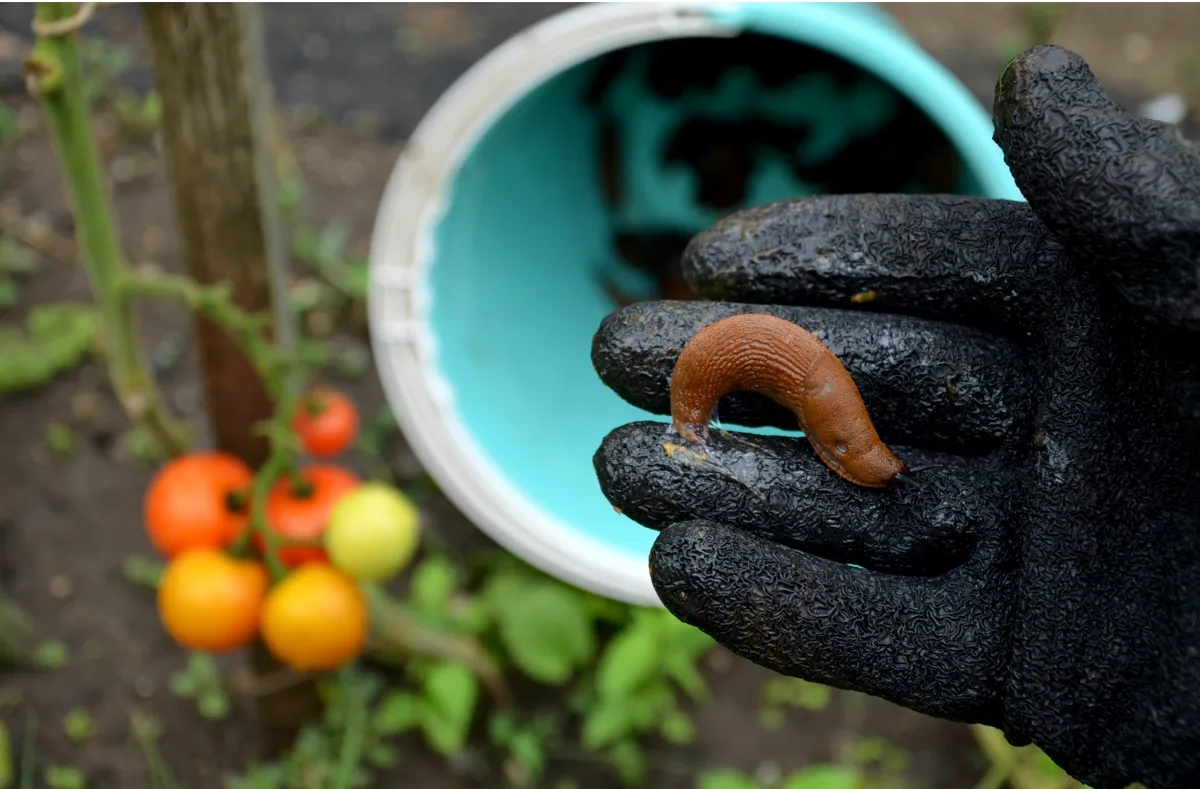As of 1 April, slug pellets containing metaldehyde can no longer be owned or sold in the UK. The ban follows the advice from the UK Expert Committee on Pesticides (ECP) and the Health and Safety Executive (HSE), and has come into force because the chemical has an unacceptable impact on the environment and wildlife.
Metaldehyde is harmful to birds, amphibians and mammals – including hedgehogs, cats and dogs – that directly consume the pellets, or eat slugs or other creatures that have been contaminated by them.
Metaldehyde works by disrupting the mucus production in slugs and snails. This reduces their ability to digest food and move around, and also makes them susceptible to dehydration. Slugs and snails that have eaten the chemical will tend to die within days.
Slug pellets based on less toxic ferric phosphate are still allowed. This chemical causes the slugs and snails to stop eating.
How can I stop slugs eating my plants?
According to Dr Hayley Jones, an entomologist at the Royal Horticultural Society (RHS) who researches slugs and snails, slug pellets should always be the last option for controlling slugs, and it’s better to start with preventative measures.
“If you’re planting out new plants, grow your seedlings on until they're bigger and sturdier so that they're not going to just die straight away if they get nibbled a bit,” she says. “Once you've got your plants in and they're being nibbled, go out at night to catch them [the slugs] in the act and pick them off, relocate them or dispose of them as you see fit.”
It's also worth researching plants that are less attractive to slugs. Generally, shrubby or woody plants, or those with waxy or furry leaves, are less tasty. Here are some common slug-resistant plants, recommended by the RHS:
- Snapdragons
- Foxgloves
- Fennel
- Bleeding heart
- Scabious
- Nasturtiums
- Pelargoniums
- Geraniums
- Fuchsias
- Aquilegia
If that doesn’t work, it is possible to buy a nematode biological control agent that you mix into water and sprinkle over your plants. The nematodes in the mixture are parasites of slugs. “It doesn't really affect snails because they don't hide underground in the way that slugs do,” says Jones. “But it will be good for treating a raised veggie bed or something like that. As well as killing the slugs on the plants, it will kill the slugs in the bed.”
The nematode is naturally occurring in the UK, so when you apply it to the soil, you’re bumping up the levels that were there before.
“It's actually quite interesting because it's not the parasite itself that kills the slug,” says Jones. “The parasite carries bacteria, and when the nematode gets into the slug’s body, it releases the bacteria. The bacteria kill the slug and then essentially the nematode breeds in the soupy slug mess that's left behind.”

The truth about salt, eggshells and copper tape…
But what about ‘traditional’ control agents – like eggshells, salt and copper tape – to keep slugs and snails off your lettuces?
“So far, there is not much scientific evidence in their favour. So for copper, there have been some studies that show copper working and some that show it not working, including a study that I did,” says Jones. “I tested copper, bark mulch, gravel, eggshells and wool pellets on lettuce. And at the end of six weeks of lettuce growth, there was no significant difference between the ones with the barriers and the ones that had nothing at all.
“The idea is supposed to be that slugs and snails don’t like sharp, rough or very dry surfaces, but as long as they're well hydrated, they can just produce extra mucus to help them overcome it. So even if it is kind of uncomfortable, if what's on the other side is tasty enough, they will they will crawl over it.
“Salt is an interesting one. I'm never quite sure what to do with that because I don't know how people use salt. The main problem with salt is that it is bad for your soil and potentially bad for your plants.”
As for beer traps, there are many studies that show you can catch lots of slugs in that way, but Jones has not yet found any research that shows plants are less damaged as a result of the trap being there.
“This is a knowledge gap I’m hoping to fill,” she says. “It maybe does have promise, but there's a chance that it might not be helpful because it's attracting the wrong kind of slugs, or because it's actually attracting them from farther away. Plus, there’s also the risk you’ll catch ground beetles and other non-target animals.”
Why are slugs important?
In the UK, there are around 44 species of land-based slugs, and of those, only nine cause any significant damage to plants. Most of them will eat rotting material, as well as fungi and algae, making them part of the clean-up crew in our gardens.
The one that causes the most problems for gardeners is the grey field slug, which is around four centimetres long when fully grown. They can often be found hiding out in lettuces and cabbages, as they are small enough to lurk within the leaves.
But is it time for us to stop fighting the slugs? After all, they’re an important component of food webs, with thrushes and other birds, hedgehogs, badgers, slow worms, frogs, toads, and all other kinds of things feeding on them.
“They are part of the ecosystem. The climate in the UK is ideal for slugs, kind of damp and middling temperature. They've been around longer than gardens have,” says Jones. “You'll never be able to get rid of slugs and snails from your garden, and you don't know what the unintended consequences would be if you could. At least take a bit more of a neutral stance: when you see a slug, recognise that it is not necessarily doing harm!"
Read more about slugs and snails:
About our expert
Dr Hayley Jones is an entomologist at the Royal Horticultural Society. She leads their research into gastropods (slugs and snails) in the garden.
